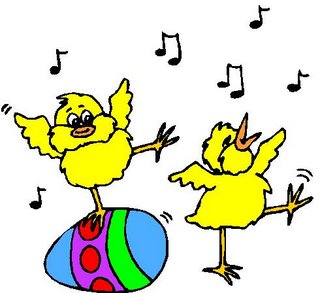26.5.06
LEZIONE 29, 7 GIUGNO 2006
Objective:
Describing recent past events (2)
FORMING THE PAST PARTICIPLE:
The past participles of all are regular verbs end in ato:
parlare ho parlato con tuo padre I spoke to your father
The past participles of all ere regular verbs end in uto:
dovere abbiamo dovuto prendere il treno we had to take the train
The past participles of all ire regular verbs end in ito:
finire i ragazzi hanno finito gli esami una settimana fa the kids finished the exams a week ago
See Italianissimo p.194
Many verbs, particularly verbs ending in ere, have irregular past participles. There is no rule to help you learn all these forms. You just need to remember them! You can find the most common ones on page 251-252 of your coursebook.
FIND BELOW SOME USEFUL LINKS TO PRACTISE AND CONSOLIDATE WHAT YOU LEARNED THIS WEEK
http://www.verdru.be/rete1/r1asu11gr01.htm (form irregular past participles)http://web.uvic.ca/hispanital/italian/italian100/verbi/prossimo1.htm (form the past tense)
Ami imparare i verbi italiani? You may find this site useful: http://www.process1.co.uk/italian_verbs_trainer.htm
19.5.06
LEZIONE 28, 24 MAGGIO 2006
Objectives:
Saying how often you do things (the present tense)
Describing recent past events (1)
Italianissimo p.61 v
1) Ogni giorno guardo la televisione I watch TV every day
Spesso vado al cinema I often go to the cinema
D’estate vado al mare In the summer I go to the sea
2) The passato prossimo describes a recently completed action:
Ho giocato a tennis I played tennis
Abbiamo mangiato spaghetti We ate spaghetti
It is formed with the present tense of the auxiliary verb avere (sometimes essere) followed by the past participle of the verb:
Ho comprato un computer I have bought a computer
See Italianissimo p.115 vi
FIND BELOW SOME USEFUL LINKS TO PRACTISE AND CONSOLIDATE WHAT YOU LEARNED THIS WEEK
Practise the present tense
http://www.iluss.it/verb_mach_free/pres_indic_3_a.htm
Learn more about the passato prossimo
http://italian.about.com/library/fare/blfare145a.htm
http://italian.about.com/library/fare/blfare345a.htm
12.5.06
LEZIONE 27, 17 MAGGIO 2006
REVISION:
Asking and explaining the way: ITALIANISSIMO p.148 vii
http://www.bbc.co.uk/languages/italian/lj/directions/index.shtml
http://www.bbc.co.uk/languages/italian/lj/driving/index.shtml
Using the present tense of common verbs:
Matching exercises with verbs ending in "are, ere, ire"
http://web.uvic.ca/hispanital/italian/italian100/verbi/are1.htm
http://web.uvic.ca/hispanital/italian/italian100/verbi/ereire1.htm
http://web.uvic.ca/hispanital/italian/italian100/verbi/ereire2.htm
A challenging translation exercise
http://web.uvic.ca/hispanital/italian/italian100/verbi/adfs10.htm
29.4.06
LEZIONE 26, 10 MAGGIO 2006

LESSON PLAN
OBJECTIVES:
- Asking and saying where something is
- Understanding and giving directions (2)
Italianissimo p.148
C'e' una banca qui vicino? Is there a bank near here?
C'e' un ristorante qui vicino? Is there a restaurant near here?
Ci sono negozi? Are there any shops?
Mi dispiace, non lo so! I'm sorry, I don't know!
Sì, c'e' una banca in via Giuseppe Verdi.
Mi scusi, dov'e' l'ufficio postale? Exuse me, where is the post office?
dov'e' la stazione?
dove sono i negozi?
Deve... You have to..
andare sempre dritto go straigh on
girare a destra/sinistra turn right/left
prendere la prima traversa a destra/sinistra take the first road on the right/left
Mi dispiace, non capisco I'm sorry I don't understand
Puo' ripetere, per favore? Could you repeate, please?
Puo' parlare lentamente? Could you speak slowly, please?
FIND BELOW SOME USEFUL LINKS TO PRACTISE AND CONSOLIDATE WHAT YOU LEARNED THIS WEEK
http://www.ciid.it/servlet/CAS?lingua=it&argomento=tutte&id_allievo=25&id_prova=286
http://www.ciid.it/servlet/CAS?lingua=it&argomento=tutte&id_allievo=25&id_prova=89 http://www.italica.rai.it/lingua/corso.htm (Click on 'English', select 'choose the style', click on 'by situation' and open 'per la strada'. Listen to the dialogue and try to do the exercises.)
LEZIONE 25, 3 MAGGIO 2006


LESSON PLAN
Objective:
Understanding simple directions (1)
1) Mi scusi Excuse me
dov'è la banca? where is the bank?
dov'è il museo where is the museum
dov’ è l’ufficio postale where is the post office?
dove sono i negozi? where are the shops?
È .....
Sono ..... davanti (in front of) al municipio
dietro (behind) l’albergo
di fronte (opposite) alla farmacia
accanto (next to) all'edicola
È ...... In via Verdi
Sono....... In Piazza Garibaldi
2) È lontano? Is it far?
È lontano il museo? Is the museum far?
È a venti minuti a piedi It’s twenty minute walk
È a cento metri It’s 100 metres away
3) Non capisco, può parlare lentamente?
Può ripetere?
FIND BELOW SOME USEFUL LINKS TO PRACTISE AND CONSOLIDATE WHAT YOU LEARNED THIS WEEK:
Interactive quizzes:
http://www.quiz-tree.com/Italian-Vocabulary_Getting-There_1_MC-4.html
http://www.quiz-tree.com/Italian-Vocabulary_Getting-There_2_MC-4.html
http://www.quiz-tree.com/Italian-Vocabulary_Getting-There_3_MC-4.html
Click on 'English', select 'choose the style', click on 'by situation' and open 'in centro'. Listen to the dialogue and try to do the exercises.
http://www.italica.rai.it/lingua/corso.htm
26.4.06
LEZIONE 24, 26 APRILE 2006
. Shopping for food and drink
. Expressing quantity
Vorrei...
un chilo (1 kilo) di pomodori
mezzo chilo (half a kilo) di mele rosse
un etto (100 grams) di prosciutto crudo
un litro (a litre) di latte
mezzo litro (half a litre) di olio d'oliva
una bottiglia di vino rosso
Quanto costa...
la mortadella all'etto? How much does the mortadella cost per 100 grammes?
il pecorino al chilo? How much does the pecorino cheese cost per kilo?
Italianissimo p.31, 70
FIND BELOW SOME USEFUL LINKS TO PRACTISE AND CONSOLIDATE WHAT YOU LEARNED THIS WEEK
http://www.bbc.co.uk/languages/italian/lj/market/index.shtml
http://www.languageguide.org/im/fruits/it/ (fruit)
http://www.languageguide.org/im/veg/it/ (vegetables)
20.4.06
LEZIONE 23, 19 APRILE 2006
To consolidate language skills through the performance of practical reinforcement exercises:
http://www.quiz-tree.com/Italian-Vocabulary_Basic-Phrases_1_MC-4.html
http://www.quiz-tree.com/Italian-Vocabulary_Basic-Phrases_2_MC-4.html
(interactive quizzes to test your knowledge on Italian basic phrases)
Per la prossima settimana (For next week): Review the language for shopping and start learning some basic food vocabulary. Italianissimo p.31
http://www.vocab.co.uk/vocabulary/uk/italian/food.htm (Italian Vocabulary - Food)
http://www.quiz-tree.com/Italian-Vocabulary_Food_2_MC-4.html (interactive quiz to learn Italian food vocabulary)
4.4.06
UN PO' DI RIPASSO
Would you like to brush up your existing knowledge in a stimulating and entertaining way? You can find in the links below a variety of games to help you reinforce and improve your Italian-language skills.
An activity to review numbers from 0-100 http://www.quia.com/mc/312486.html
A challenging game to review food and drink vocabulary http://www.quia.com/cb/8113.html
Italian Hangman - Family Members. Who are the members of your family? http://www.quia.com/hm/22759.html
Puzzled by verbs? Try this games!:
Avere, Essere and Stare - To Have, To Be, To Stay http://www.quia.com/rr/34442.html
http://www.quia.com/mc/401136.html
The definite articles (il, lo, la, i, gli, le) http://www.quia.com/rr/49191.html
Days and months http://www.quia.com/mc/506271.html
24.3.06
LEZIONE 22, 29 MARZO 2006

LESSON PLAN
OBJECTIVES:
- Shopping for clothes and shoes
- Getting the right size
- Saying what colour you would like
Abbigliamento e calzature: Italianissimo p.31
Vorrei un paio di pantaloni neri I would like a pair of black trousers
Che taglia porta? What size are you? (clothes)
La taglia 42
Che numero porta? What size are you? (shoes)
Posso provare questa camicia? Can I try this shirt on?
E' troppo grande/piccola It's too big/small
E' troppo larga/stretta It's too large/small
E' troppo lunga/corta It's too long/short
Avete una taglia piu' grande/piccola? Do you have a bigger/smaller size?
Avete un numero piu' grande/piccolo?
Avete altri colori? Do you have it in any other colours?
Queste scarpe sono molto comode These shoes are very comfortable
FIND BELOW SOME USEFUL LINKS TO PRACTISE AND CONSOLIDATE WHAT YOU LEARNED THIS WEEK
http://web.uvic.ca/hispanital/italian/italian100/vocab/colori.htm (learn Italian colours)
http://www.languageguide.org/im/clothes_men/it/ (men's clothing. Very good to build your vocabulary)
http://www.languageguide.org/im/clothes_women/it/ (women's clothing. Very good to build your vocabulary)
http://www.bbc.co.uk/languages/italian/lj/clothes/index.shtml
http://www.italica.rai.it/lingua/corso.htm (click on CORSO ELEMENTARE > ENGLISH > CHOOSE THE STYLE > AL MERCATO, then try to listen to the dialogue without reading. After that go back to the previous page and click on IN UN NEGOZIO DI SCARPE, listen to the dialogue and then click on EXERCISES. Try to complete them all.)
Buona Pasqua a tutti. Ci rivedremo il 19 aprile!

17.3.06
LEZIONE 21, 22 MARZO 2006
OBJECTIVES:

- Asking for items in a shop
- Understanding prices in euro
- Saying you will take it
1) Desidera? Mi dica.. Can I help you? Italianissimo p.66, 68
Mi da' un francobollo per la Gran Bretagna? Can I have a stamp for
Britain?
Avete giornali inglesi? Have you got English newspapers?
2) Quanto costa la cartolina? How much is the postcard? Italianissimo p.68
Quanto costa? How much does it cost?
Quant'e' ? How much is it?
3) Lo compro! I'll take it, I'll buy it!
4) I prezzi in euro:
€ 1,00 un euro € 2,00 due euro € 4,20 quattro euro e venti
€ 0,01 un centesimo € 0,15 quindici centesimi € 100,00 cento euro
5) Compito per casa: esercizi
FIND BELOW SOME USEFUL LINKS TO PRACTISE AND CONSOLIDATE WHAT YOU LEARNED THIS WEEK
http://www.bbc.co.uk/languages/italian/quickfix/shopping.shtml
http://www.bbc.co.uk/languages/italian/lj/essentials/index.shtml
http://www.italica.rai.it/lingua/corso.htm (click on CORSO ELEMENTARE > ENGLISH > CHOOSE THE STYLE > BY SITUATION > IN UN NEGOZIO DI DISCHI, then listen to the dialogue. After that go to AL MERCATO click on EXERCISES and try to do all the exercises)
11.3.06
LEZIONE 20, 15 MARZO 2006

LESSON PLAN
OBJECTIVES:
Reserving a hotel room
Using months of the year
Spelling your name in Italian
1) Vorrei una camera I would like a Italianissimo p.66
singola single room
doppia: double room:
matrimoniale
a due letti twin-bedded room
2) Per/ una notte
tre notti
una settimana
dal 10 al 17 luglio
3) I mesi dell'anno (Months of the year) Italianissimo p.241
4) Come si scrive il tuo nome? How do you spell your name?
L'alfabeto italiano (Italian alphabet) Italianissimo p.6
5) Compito per casa: Esercizi
MARIA: emme (M) a (A) erre (R) i (I) a (A)
FIND BELOW SOME USEFUL LINKS TO PRACTISE AND CONSOLIDATE WHAT YOU LEARNED THIS WEEK
http://www.bbc.co.uk/languages/italian/quickfix/accommodation.shtml
http://web.uvic.ca/hispanital/italian/italian100/prelim/index.htm (go to I GIORNI DELLA SETTIMANA and then STAGIONI E MESI)
6.3.06
LEZIONE 19, 8 MARZO 2006
OBJECTIVES:
Describing your weekly routine
Saying how often you do things
Saying what job you do
1) I giorni della settimana (Days of week) Italianissimo p.241
2) Che cosa fai durante la settimana? e.g. :
- il lunedí lavoro
- il martedí lavoro
- il mercoledí vado a lezione di italiano
- il giovedí lavoro
- il venerdí faccio la spesa
- il sabato faccio le pulizie e vado in palestra
- la domenica esco, a volte vado al cinema o al ristorante
3) Phrases expressing frequency Italianissimo p.61 v-vi
- Quanti giorni alla settimana lavori?
- Lavoro tre giorni alla settimana
- Che lavoro fai?
- Faccio il meccanico
- Faccio lo psicologo
- Faccio l'infermiera
- Faccio la cameriera
5) Compito per casa: Esercizi
FIND BELOW SOME USEFUL LINKS TO PRACTISE AND CONSOLIDATE WHAT YOU LEARNED THIS WEEK
http://www.bbc.co.uk/languages/italian/lj/jobs/index.shtml
http://academic.brooklyn.cuny.edu/modlang/carasi/site/lessons/lesson10/10pagethree.html
http://academic.brooklyn.cuny.edu/modlang/carasi/site/lessons/lesson04/pageone.html
5.3.06
LEZIONE 18, 1 MARZO 2006

LESSON PLAN
OBJECTIVES
Using reflexive verbs to talk about your daily routine
Saying at what time these actions take place
A verb is reflexive when it expresses an action that refers back to the subject e.g.
Mi lavo (lit. I wash myself) Mi riposo (lit. I rest myself). You can recognize a reflexive verb (sul dizionario) by looking at the infinitive form. If the syllable of the infinitive is -si (oneself), then the verb is reflexive. When you conjugate a reflexive verb you must change the last syllable -si with -mi (myself) -ti (yourself) etc. : Lavarsi (to wash oneself) Mi lavo, ti lavi, si lava etc.
See Italianissimo p.85, 87, 56 (What's it like?)
Attenzione: do not assume every verb that describes your daily routine is reflexive
Faccio la colazione (I have breakfast)
Vado al lavoro (I go to work) etc.
Compito per casa (Homework): in classe describe your daily routine and say what you do for living.


